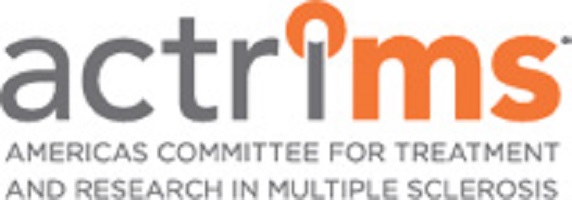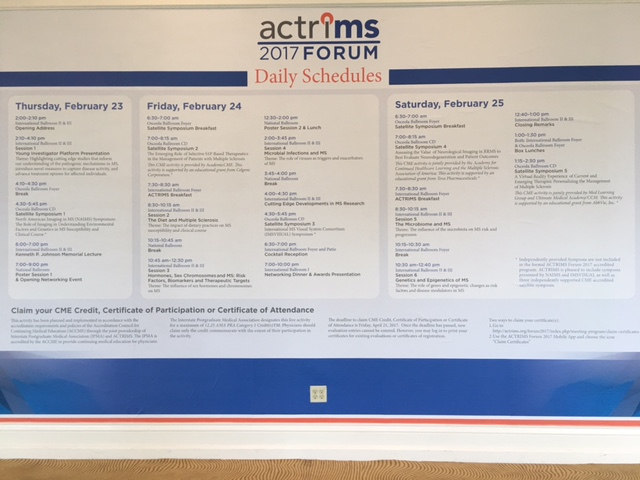#ACTRIMS2017 – Learning is Underway at Annual MS Confab
Written by |


Editor’s note: Columnist Laura Kolaczkowski reports from ACTRIMS in Orlando, Fla.
The second Annual Americas Committee for Treatment and Research in Multiple Sclerosis (ACTRIMS) got under way in Orlando, Fla., today and runs through Saturday. I have the honor of being on site to hear presentations from the clinicians and researchers who will be sharing the latest news about MS.
ACTRIMS was founded in 1995 and, until last year, its annual meetings were held jointly with other neurology meetings. Last year they broke out on their own and were surprised by the attendance and interest from MS researchers in Canada and the United States. The attendance continues to grow and this year there are almost 700 people in attendance.
In addition to keynote talks and poster presentations, ACTRIMS has a Neurology Resident Summit in Neuro-immunology on the program. This summit, held in advance of the main meeting, has 47 medical residents from the U.S. and Canada in attendance. The participants are being fostered in the field of neuro-immunology specific to MS, and future opportunities in MS specialty care and research. The lack of clinicians and researchers in MS is a well- documented problem and it is encouraging to see this part of the ACTRIMS program. These residents also will participate in the rest of the meeting and I hope they leave excited about the opportunities in their careers with MS.
The meeting theme is Environmental Factors, Genetics and Epigenetics in MS Susceptibility and Clinical Course. Unlike many of the professional meetings, a plus for me is the ACTRIMS program is linear; there is one presentation at a time and I don’t have to choose which presentation I might want to attend and have to skip others. The schedule for the three days is easily spotted on the wall outside the main ballroom and lists the key topics being presented. You can see what is on tap in this photo:

First up is presentations from Young Investigators, which can be a favorite to hear new ideas from fresh, enthusiastic researchers. There were several hundred abstracts submitted and eight were chosen as exemplary to present at ACTRIMS 2017. It is important to me to see that the established researchers are working closely with undergraduate and graduate students to advance MS knowledge. To be honest, as I listen from the perspective of a liberal arts major and not a scientist, there are way too many words I don’t understand. But their enthusiasm is impressive. Their composure as they faced questioning from audience members who have been in MS research for years, many for longer than these students’ ages, was great to watch. The confidence of young researchers is refreshing and provides hope for new breakthroughs.
I’ll be sharing more news from ACTRIMS 2017 in the coming days.
Note: Multiple Sclerosis News Today is strictly a news and information website about the disease. It does not provide medical advice, diagnosis, or treatment. This content is not intended to be a substitute for professional medical advice, diagnosis, or treatment. Always seek the advice of your physician or other qualified health provider with any questions you may have regarding a medical condition. Never disregard professional medical advice or delay in seeking it because of something you have read on this website. The opinions expressed in this column are not those of Multiple Sclerosis News Today, or its parent company, Bionews Services, and are intended to spark discussion about issues pertaining to multiple sclerosis.



Jane
Dear Ms Laura Kolaczkowski,
You are my favorite reporter!
Totally honest and diligent to get to the truth!
Personally, I am anxious to see some decent research that will
get results. The new drug Ocrelizumab does not work for long as you cannot keep depleting B cells.
There will be a cure in the near future because people have had enough of the poisons and hoaxes that are out there.
Laura Kolaczkowski
Jane, that is so kind of you to write and say so, but I'm sure there have to be other MS bloggers you also follow in the MS community. There is a slew of very talented and earnest people all working hard to elevate our understanding of this disease. As for ocrelizumab ad B-cell therapy, Rituximab, its sister drug has been in use for over 25 years which is a pretty long track record. The safety concerns you raise are legit though, since this is a humanized form and not a chimeric version of the drug. One would think it would be even safer .... time will tell. And yes, we need a cure. Thanks again for taking the time to write. -Laura
James Stewart
Hi Jane,
Thank you for the report. I would have loved to attend this conference. Any way we can get more of what was said in Session 6 - Genetics and Epigenetics of MS?
Thank you,
James Stewart